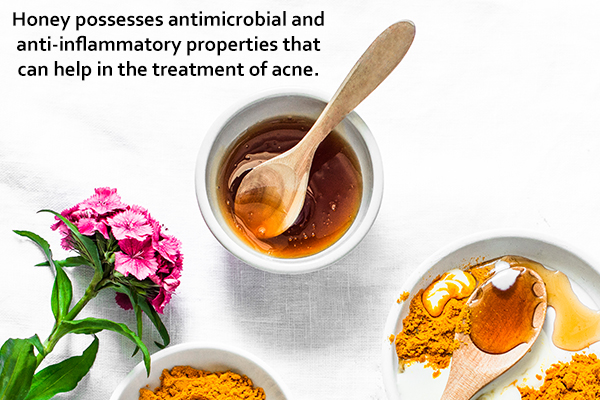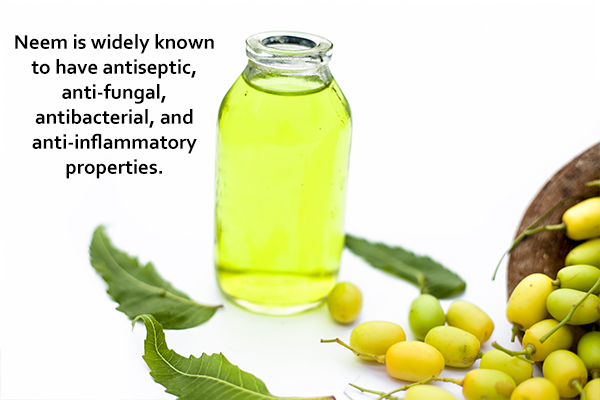Home Remedies and Self-Care Tips for Acne
Written by Jessica Lal on February 3, 2023
Acne, more commonly known as pimples, refers to the outbreak of skin lesions, usually on the face, chest, neck, back, and shoulders. While highly prevalent, acne is rarely a health concern. However, severe acne can lead to permanent scarring and often affects a person’s self-esteem.
Home Remedies for Acne
Severe acne requires medical intervention, but mild acne that involves the development of whiteheads, blackheads, and pimples can be improved with the help of home remedies.
1. Use over-the-counter cleansers and creams
Over-the-counter cleansers are highly popular for helping clear acne. You can also use products that contain vitamin A, retinoid, benzoic peroxide, and salicylic acid for the same.
2. Apply a honey mask

Honey possesses antimicrobial and anti-inflammatory properties that can help in the treatment of acne. Honey is shown to inhibit the growth of various dermatological microbes and dermatophytes, such as Propionibacterium acnes, that cause acne.
How to use: You can either apply honey to the affected areas directly or use it as a mask.
- Mix 1 teaspoon of cinnamon or turmeric in 2 tablespoons of honey.
- Wash your face with a mild cleanser.
- Apply the honey paste on your face.
- Leave it for a few minutes and then gently wash your face.
3. Try essential oils for spot treatment
Resistant acne-causing microbes, such as Propionibacterium acnes and Staphylococcus epidermidis, may be treated with essential oils.
One such essential oil with potent antimicrobial properties is tea tree oil. It helps prevent microbial growth in the sebaceous glands, thus inhibiting acne and pus formation. Oregano essential oil also exhibits a strong antimicrobial effect against acne-causing bacteria.
Jojoba oil is anecdotally used for acne treatment as well. While studies have demonstrated the anti-inflammatory nature of jojoba oil, there has been no direct scientific evidence for its use in acne treatment.
Caution: It is important to dilute essential oils in a carrier oil such as coconut oil before use. Always perform a patch test to check for reactions.
Summary:Essential oils such as tea tree, jojoba, and oregano oil may be used as safe and efficacious alternative treatments for acne due to their antibacterial and anti-inflammatory properties.
4. Use witch hazel
Witch hazel is anti-inflammatory and astringent in nature and thus may help dry out inflammatory acne. Witch hazel may help control acne and improve the appearance of inflamed and red facial skin when used as a part of an anti-acne skin care regimen.
5. Apply neem oil

Neem is widely known to have antiseptic, antifungal, antibacterial, and anti-inflammatory properties.Neem oil has also been used effectively for the prolonged treatment of acne.
6. Try a 2%–3% hydrogen peroxide solution
A 2019 study concluded that a topical solution of 3% hydrogen peroxide (H2O2) reduces the bacterial burden of C. acnes.
The use of hydrogen peroxide is also backed by substantial anecdotal evidence. It is thought to work by oxidizing the skin, which helps kill acne-causing bacteria.
How to use: Dip a clean cotton ball in hydrogen peroxide and apply it to your acne for a minute. Once it dries out, apply a moisturizer.
7. Use aloe vera gel
Aloe vera gel contains anti-inflammatory and antibacterial properties that can help treat mild to moderate acne. It is a safe topical agent, which can be used in combination with other treatments.
Aloe vera gel mixed with tretinoin cream was seen to significantly reduce mild to moderate acne as compared to tretinoin cream alone. Another formulation of aloe vera gel was found to work better than 1% clindamycin gel for acne treatment.
8. Try apple cider vinegar
Apple cider vinegar (ACV) is a popular anecdotal anti-acne agent, although its use is not supported by any scientific study. ACV is thought to help reduce acne formation by shrinking the pores and killing bacteria.
How to use: Dilute ACV with water, and apply the mixture to the affected areas using a cotton ball.
Biofeedback Therapy
While mild cases of acne can be treated with home remedies, moderate to severe acne may require alternative therapies. One such treatment is biofeedback therapy. This treatment modality chiefly focuses on dealing with anxiety and stress as triggers of acne.
Self-Care Measures to Reduce Acne

For long-term treatment of acne, it is vital to take good care of your skin. The following tips may help:
- Avoid excessive washing of your skin as it can cause dryness and irritate the existing acne.
- It is best to wash your face twice a day with a mild cleanser containing benzoyl or salicylic acid, especially if you have oily skin that is prone to acne.
- Use only non-acnegenic or noncomedogenic skin products, including makeup, lotions, and creams.
- Abstain from picking or rubbing your pimples as it can aggravate the condition and even lead to infections and scarring.
- Limit your time under the sun as acne medications can make you prone to sunburns.







